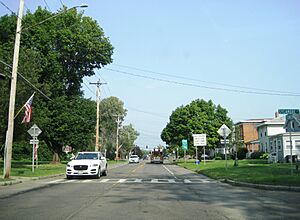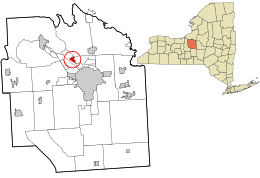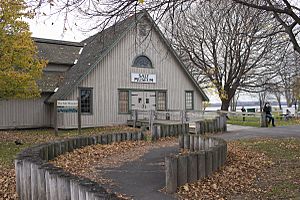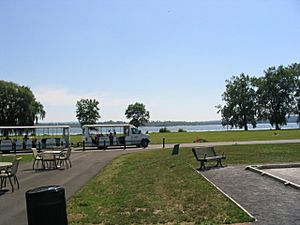Liverpool, New York facts for kids
Quick facts for kids
Liverpool, New York
|
|
|---|---|
|
Village
|
|

Looking east along NY 370 (Second Street) in Liverpool
|
|

Location in Onondaga County and New York state
|
|
| Country | United States |
| State | New York |
| County | Onondaga |
| Area | |
| • Total | 0.75 sq mi (1.95 km2) |
| • Land | 0.75 sq mi (1.95 km2) |
| • Water | 0.00 sq mi (0.00 km2) |
| Elevation | 420 ft (128 m) |
| Population
(2020)
|
|
| • Total | 2,242 |
| • Density | 2,985.35/sq mi (1,151.89/km2) |
| Time zone | UTC-5 (Eastern (EST)) |
| • Summer (DST) | UTC-4 (EDT) |
| ZIP codes |
13088-13090
|
| Area code(s) | 315 |
| FIPS code | 36-42884 |
| GNIS feature ID | 0955742 |
Liverpool is a small village located next to Onondaga Lake in Onondaga County, New York, United States. In 2020, about 2,242 people lived there. The village got its name from the famous city of Liverpool in the United Kingdom.
Liverpool is part of the town of Salina and is northwest of Syracuse. It's considered a suburb of Syracuse, meaning it's a smaller community near a larger city.
Contents
History of Liverpool
The area where Liverpool is now was first home to the Iroquois people, starting in the 1500s. In the mid-1600s, French Jesuits (who were Catholic priests) visited the area to set up missions, but these were not permanent. One example was Sainte Marie among the Iroquois, located near Onondaga Lake.
Later, when the Erie Canal and Oswego Canal were built, many people moved to the area. These included Irish workers who helped build the canals, settlers from other parts of America (called Yankees), and German immigrants. Because of the many Irish workers, the village was first called "Little Ireland."
Two important historical places in Liverpool are the Lucius Gleason House and the Liverpool Cemetery. Both are listed on the National Register of Historic Places, which means they are important to the history of the country.
Salt Industry and Canals
In the 1800s, Liverpool was known for its salt production. The village played a big role in the salt industry around Onondaga Lake. You can learn all about how salt was mined and produced in the area by visiting the Salt Museum.
How Liverpool Got Its Name
The New York State surveyor general planned the streets for the village. On April 20, 1830, the village's name was officially changed from "Little Ireland" to "Liverpool." It was renamed after the city of Liverpool in England. This was likely because both places were known for producing salt. The leaders of the village probably wanted to use the famous name of the English city.
Interestingly, about 15 years later, many people from Ireland moved to England during the Great Famine. So many went to Liverpool, England, that the city itself became known as "Little Ireland."
Village Industries
The hotel business was very popular in Liverpool. For example, George Ingersoll built the Globe Hotel. In the 1890s, Liverpool was also a center for making cigars.
In 1918, the Oswego Canal was closed. Today, much of the old canal path is part of Onondaga Lake Park, which opened in 1931.
Geography
Liverpool is located at 43°6′21″N 76°12′34″W / 43.10583°N 76.20944°W. It covers most of the northeastern side of Onondaga Lake.
Onondaga Lake Park is a very popular spot in Liverpool. It has special trams that take visitors along the park's paths. More than a million people visit the park every year.
The United States Census Bureau says that the village is about 0.8 square miles (1.95 square kilometers) in size, and all of it is land.
New York State Route 370 is a main road that goes through the village from east to west. The New York State Thruway (Interstate 90), which is a major highway, passes through the northern part of Liverpool.
Liverpool is also home to a factory for Lockheed Martin, a large aerospace and defense company.
Onondaga Lake Park
Onondaga Lake Park is a county park located on the eastern shore of Onondaga Lake. It's found at 6790 Onondaga Lake Trail in Liverpool. The park is home to the Salt Museum and the East Shore Recreation Trail. Many people who live in the area use the park for walking, running, and other exercises.
Notable People
Many interesting people have connections to Liverpool, including:
- Tim Green, a former football player, TV personality, and lawyer.
- Chris Gedney, a football player.
- Doug Heveron, a NASCAR race car driver.
- Josh Ford, a soccer player.
- Adam Fullerton, a professional lacrosse player.
- Jeorgio Kocevski, a soccer player.
- Chris Madden, a retired ice hockey goalie.
- Donald R. Miller, a New York State assemblyman (a person who helps make laws for the state).
- Jack Smith, a Special Counsel for the Department of Justice (a high-level lawyer for the government).
Population Information
| Historical population | |||
|---|---|---|---|
| Census | Pop. | %± | |
| 1870 | 1,555 | — | |
| 1880 | 1,350 | −13.2% | |
| 1890 | 1,284 | −4.9% | |
| 1900 | 1,133 | −11.8% | |
| 1910 | 1,388 | 22.5% | |
| 1920 | 1,831 | 31.9% | |
| 1930 | 2,244 | 22.6% | |
| 1940 | 2,500 | 11.4% | |
| 1950 | 2,933 | 17.3% | |
| 1960 | 3,487 | 18.9% | |
| 1970 | 3,307 | −5.2% | |
| 1980 | 2,849 | −13.8% | |
| 1990 | 2,624 | −7.9% | |
| 2000 | 2,505 | −4.5% | |
| 2010 | 2,347 | −6.3% | |
| 2020 | 2,242 | −4.5% | |
| U.S. Decennial Census | |||
In 2000, there were 2,505 people living in Liverpool. Most people were White (about 96%), with smaller groups of African American, Native American, and Asian residents. About 1.8% of the population was Hispanic or Latino.
The average age of people in the village was 39 years old. About 20.6% of the population was under 18 years old.
Education
The schools in Liverpool are part of the Liverpool Central School District.
See also
 In Spanish: Liverpool (Nueva York) para niños
In Spanish: Liverpool (Nueva York) para niños



